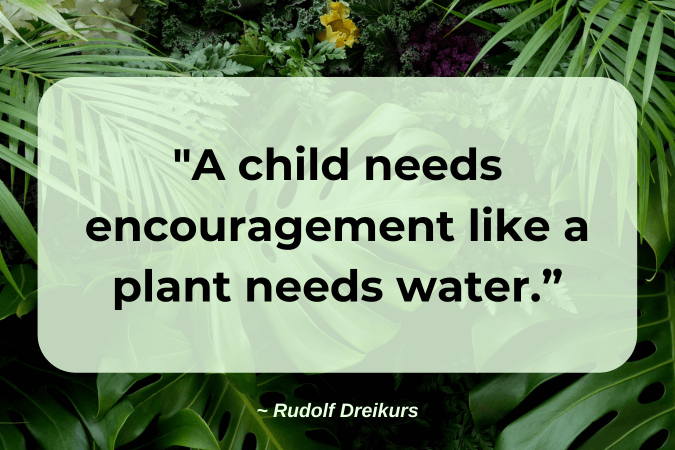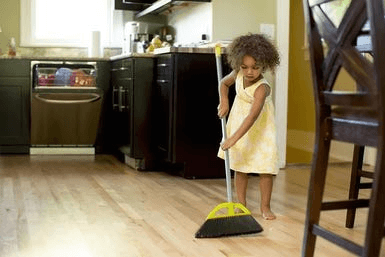Moving from praise to encouragement
I’ve been soaking up everything I can about Positive Discipline for the last five years or so, and most of it has come fairly easily to me. It takes patience, intention, consistency, and effort, but most of the tools and strategies have always “clicked” for me. That being said, I am still, every day, working on moving from praise to encouragement with my nanny kids. This has been so challenging for me! I understand the “why” and the benefits, but it’s a way of speaking to children that I’m still very much practicing (and often failing at).
I come from a background in teaching, and I swear while I got my degree in Elementary Education, many books, professors, and classes told us to praise, praise, praise kids. Ignore “bad behavior,” and praise “good behavior.” That will motivate the other kids to do the “good behavior,” too! Praise what you want to see, and they’ll keep doing it. Turns out, that’s not the case. At all. Not only is it a faulty premise – it’s an incredibly hard habit to break!
What is praise? What is encouragement?
One way to discern praise and encouragement is that praise is about you. “I like your picture!” “You did it just the way I said!” Encouragement is about them. “You worked hard on that!” “Can you tell me more about that!” Praise is about obedience, whereas encouragement is about growth. Encouragement is motivating & encouraging. Praise can be mindless – you don’t even have to look up from your phone to say, “good job.” Encouragement takes more effort because it’s genuine & leaves room for dialogue. “How did you do that?”

Why shift to encouragement?
In Positive Discipline we often say that praise is like candy – fine in moderation! The problem with praise is that it creates “praise junkies” who will crave more. Unfortunately, praise is an extrinsic motivator, and extrinsic motivation means children who want to do things for a reward. We don’t want kiddos to do things or make choices to earn a reward. If praise is candy, then encouragement is vegetables – we want kids to have this as much as possible! Encouragement fosters self-evaluation and intrinsic motivation. These are the kiddos who do the right thing when nobody is looking. Encouragement promotes a growth mindset & children who will tackle a challenge. Encouragement appreciates effort and improvement, not obedience and perfection.
Consider for yourself what is more meaningful. Would you rather get a quick, thoughtless “good job” from your boss, or a detailed, specific observation of something they saw you working hard on? To me, praise with nothing behind it feels patronizing and inauthentic.
An encouraged child feels connected and is less likely to misbehave, so another reason to lean into encouragement is because it makes our job easier.
Examples of encouragement
What does encouragement really sound like? Here are some examples:
“You gave it your best try.”
“How do you feel about it?”
“You worked hard on that!”
“Tell me about your picture.”
“You must be feeling proud of yourself!”
“You decide.”
“You figured it out!”
“What do you think?”
“You are so focused on that.”
“You did it yourself!”
“I love you no matter what.”
How do we do it?
Like I said, this has been truly challenging for me. I’ve been consciously working on this for years, and I still hear myself rattling off empty praise more often than I’d like. My best tip is that when you hear yourself praising, pause, and offer encouragement in addition. One praise phrase that drives me nuts, yet is still coming out of my mouth constantly, is the generic “good job!” Ugh, I cringe even writing it! When I hear myself say, “good job,” I stop and find an encouraging phrase I can add. “I saw you working really hard on that math homework tonight, Kiddo!” I hope that as I keep working on it, encouragement will come more naturally and the praise will drop off.
My other tip is to focus and set an intention around encouragement. Choose the child you most need to connect with in your care and make sure you’re offering them encouragement at least twice each day. Or, choose an encouraging phrase and make sure you’re using it that day as often as you can. I’ve written giant “E”s on the back of my hand, and I’ve plastered post-it notes all over my stuff to remind me – “encourage!”
I do use encouragement more often than I used to. If I keep practicing and focusing on it, I think it will come more and more naturally, and I invite you to try, too! As Rudolf Dreikurs said, “A child needs encouragement like a plant needs water.”





Comments